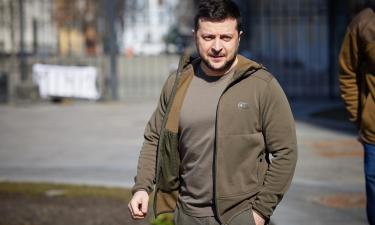The Open Door to Co-Operation With Iran
 Tehran has agreed to sign an additional protocol to the Non-Proliferation Treaty (NPT) and, as a sign of good will, pledged to halt its uranium enrichment project. Statements to this effect were made at the end of the talks between the Iranian leaders and the foreign ministers of France, Britain and Germany, which were held in Tehran on Tuesday. Europe and Russia heaved a sigh of relief: the signing of the additional protocol opened new opportunities for co-operation with Iran.
Tehran has agreed to sign an additional protocol to the Non-Proliferation Treaty (NPT) and, as a sign of good will, pledged to halt its uranium enrichment project. Statements to this effect were made at the end of the talks between the Iranian leaders and the foreign ministers of France, Britain and Germany, which were held in Tehran on Tuesday. Europe and Russia heaved a sigh of relief: the signing of the additional protocol opened new opportunities for co-operation with Iran.
It is especially important for Moscow that Ali Akbar Salehi, Iran's representative in the IAEA, said that Tehran was also ready to sign a protocol to the agreement on the Bushehr nuclear station, stipulating the return of spent nuclear fuel to Russia. Negotiations on the protocol have been going on for several months; without it Russia will not deliver nuclear fuel to the Bushehr station, Vladimir Putin said at a press conference in Bangkok. On the whole, differences between Moscow and Tehran are limited mostly to the technical and commercial sides of the problem and will not influence Moscow's resolve to carry on nuclear power engineering and other forms of co-operation with Iran. Judging by what Mr Salehi has said, this problem is as good as settled.
Russia and Iran are "linked not only by centuries of history," believes Deputy Foreign Minister Alexander Losyukov. "Iran is our neighbour and partner whom we value highly, with whom we have similar stands on many regional and international issues, and with whom we closely collaborate on the bilateral level and in multilateral institutions, in particular on the fight against terrorism, drug trafficking, and, last but not least, the proliferation of weapons of mass destruction."
Anyway, the news from Tehran concerning the compromise with the IAEA was entirely welcome. Under the September 12 resolution of the IAEA Board of Governors, Iran had to sign an additional protocol, giving IAEA inspectors free access to its facilities, before October 31. The matter would have been turned over to the UN Security Council, if Tehran had rejected the document.
According to information from diplomatic sources leaked to the press, the British, German and French foreign ministers offered Iran technical assistance, including in the implementation of its peaceful nuclear programme, in return for full transparency and co-operation with the IAEA. They confirmed the right of any country to have peaceful nuclear programmes. This statement is of vital significance for Iran, as Washington had repeatedly hinted that Iran did not need nuclear energy because it has vast amounts of natural sources of energy, i.e. oil and gas. Following this logic, Iran could use nuclear power for military purposes alone.
So far, only Russia has been helping Iran to develop its nuclear power engineering. For several years now, Russia has been trying to prove that its assistance is justified and legitimate. Vladimir Rushailo, Secretary of the Russian Security Council, once said in an interview that Russia proceeded from the belief that "Iran as a signatory of the NPT and a member of the IAEA has a right to international assistance for the development of its nuclear power engineering." President Vladimir Putin confirmed this stand at the G8 summit in Evian, conditioning Russia's assistance on Iran's agreement to place its nuclear facilities under IAEA control.
Moscow hoped that Tehran would sign the additional protocol, while it has repeatedly called on Iran to make its nuclear programme transparent. This would rule out any misinterpretation and speculation concerning Russia's assistance to any alleged Iranian "nuclear weapons programme." This would also put an end to unfair US sanctions against several Russian companies that co-operate with Iran.
President Putin said at the Bangkok press conference, "if Iran complies with all conditions of the international community, opens up all its programmes and signs the additional protocol on IAEA safeguards, there will be no reason to limit co-operation with it, including in such a delicate sphere, as the nuclear one."
We can only hope that the visit of senior European diplomats to the Iranian capital will ease tensions around Iran and that nothing will hinder the development of economic co-operation with it.
Marianna BELENKAYA, RIAN
Subscribe to Pravda.Ru Telegram channel, Facebook, RSS!




